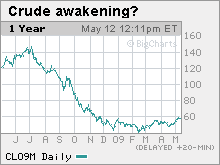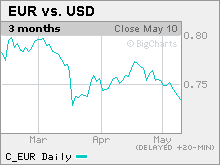Three cheers for higher oil prices!
Kind of. Oil at $60 is good news if the rise is fueled by stronger demand, not a weak dollar and speculation. But at some point oil prices may become too high.

 |
| Oil prices have shot up in recent months but still remain well below last year's all-time highs. |
 |
| The dollar has lost ground versus the euro in the past three months. But it hasn't weakened enough to fully account for the spike in oil prices. |
NEW YORK (CNNMoney.com) -- The price of oil is back towards $60 a barrel for the first time since November. Prices have shot up more than 70% since hitting their low point for the year in mid-February.
At first blush (or gush) it is tempting to declare that the recent spike in oil prices is bad news. Gas prices are up about 10% in the past two weeks.
And consumers remember all too well what it was like when oil was over $147 a barrel and gas prices hit more than $4 a gallon.
But I come to praise the prospect of higher oil prices, not bury them. Hear me out before sending the hate mail.
As I explained in a column three months ago, some expected oil to rally if there were signs of an economic recovery on the horizon. Increased demand usually leads to higher prices.
"The rise in oil prices is a symptom of something that's good. We are starting to see signs of growth and that economies around the world are coming back," said David Wyss, chief economist with Standard & Poor's.
To be sure, there are some concerns (which I share) that investors are getting ahead of themselves. The dramatic rally in stocks in the past two months is a perfect example of investors' newfound sense of economic enthusiasm running amok.
However, there is evidence that the rise in oil prices is actually a function of improving fundamentals in the global economy.
According to reports, China's oil imports increased nearly 14% in April from a year ago. That's the first year-over-year rise in oil imports this year. If China's economy is starting to improve, prices should continue to move up, especially if those "green shoots" in the U.S. economy really sprout.
"China has a huge thirst for commodities. Concrete signs of demand from China, and to some degree the U.S., are helping to lead the acceleration in oil prices. It's more about actual demand, not just speculation," said Kathy Lien, director of currency research at GFT, a foreign exchange and futures brokerage firm.
The recent rise in oil prices also appeared overdue because crude prices, when compared to gold, were out of whack. In my February column, I pointed out how several commodity experts said that gold prices historically trade at about 15 times the price of oil.
When the so-called gold-to-oil ratio is much higher than that, it's a sign of a panic since it means people are worried that demand for oil is low and that they should flock to gold in a flight to safety.
Well, guess what? As fears of a global depression have ebbed, gold prices have stabilized and oil prices have bounced back. So the gold-to-oil ratio is now a more normal 16.
In addition, the increase in oil prices isn't really being fueled (pardon the pun) too much by the weakening dollar. That's a good thing since it also points to less speculation in the market.
The price of crude, which is an asset that is priced in dollars, usually increases when the greenback loses ground against other major global currencies.
And while the dollar has given up much of the ground it gained against the euro in recent months, the dollar's recent slide shouldn't be pegged as the major culprit behind oil's spike. After all, the dollar has only lost about 5% since mid-February.
"You have to pay attention to the order of magnitude," Wyss said. "I don't think the weaker dollar explains that much of the increase in oil -- maybe a dollar or two."
Still, some wonder if the rise in oil prices might also be a sign that commodity investors are betting on a return of inflation.
While it may seem premature to talk about inflation at a time when housing prices continue to fall, some say the threat of rising prices for commodities and other goods should not be dismissed.
With the U.S. government essentially printing gobs of money to help pay for stimulus, various bailout programs and to finance the deficit, the increase in the money supply could spark inflation sooner rather than later.
And investors in U.S. Treasurys are clearly starting to worry about a glut of long-term bonds on the market and the potential for inflation to rear its ugly head again.
Bond prices have fallen in recent months -- even though the Fed has been purchasing U.S. Treasurys. That's pushed bond yields, which move in opposite directions to prices, higher. Rising yields are often viewed as a sign the bond market is more concerned with inflation than an economic slowdown.
"People are seeing inflation on the horizon and lining up their portfolios accordingly," said David Beahm, vice president of economic research with Blanchard & Company Inc, a New Orleans-based investing firm that specializes in commodities.
With all that in mind, the big question going forward is how much higher does oil need to go before people need to worry that oil prices could become something that chokes off any expansion in the economy.
Fortunately, few expect a major spike in oil prices. Beahm said a normal range for oil prices would be about $70 to $80 a barrel while Wyss said $70 to $90 a barrel makes sense. So if energy prices stabilize, they probably won't have that big of an impact on consumers.
"The magnitude of the increase at the gas pump hasn't been all that big to date to hurt consumers. And demand is still relatively weak. Ultimately supply and demand determine prices and we need demand to really recover to be consistent with higher prices," said Keith Hembre, chief economist with First American Funds in Minneapolis.
But crude prices don't have to go back to last summer's stratospheric levels in order to be a cause for concern.
Lien is hopeful that oil should level out around $65. She thinks if crude prices move much higher than that, there could be problems for this nascent recovery -- if this is in fact a recovery.
"Oil at $80 is something that could be crippling for the U.S. consumer. Talk of hyperinflation could be resurrected by a further surge in commodity prices," she said.
Wyss agreed that further increases bear watching. At the very least, rising oil prices could mean that the economic rebound which investors in stocks now appear to be banking on could take longer to materialize.
"The recovery could be delayed because higher oil prices are a tax on consumers. It could slow down consumer spending and make a recovery more difficult," he said. "Every dollar you spend at the gas tank is one more dollar you don't have to spend at the shopping mall." ![]()

